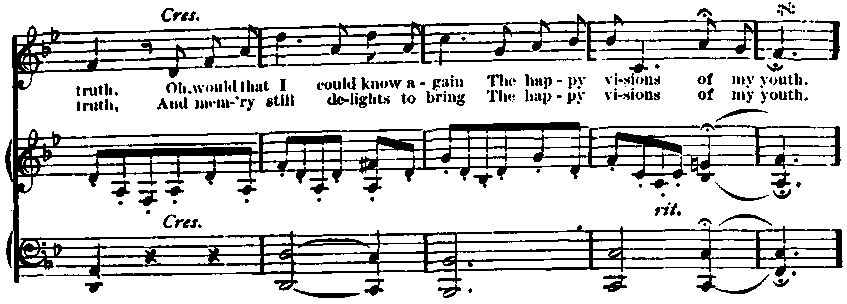Familiar Songs - Their Authors & Histories
300 traditional songs, inc sheet music with full piano accompaniment & lyrics.
| Share page | Visit Us On FB |
|
18 |
OUR FAMILIAR SONGS. |
||
 |
|||
|
THE OLD OAKEN BUCKET.
The public that has so often slighted the names of its pleasantest comforters, has occasionally sought to raise from obscurity one to whom its debts were infinitely less. Samuel Woodworth deserved from his fellow men nothing more than the common decencies of life, imtil he chanced, by mere persistency of scribbling, to produce something which, though but tolerable as poetry, touched the universal heart. To popular impression seems to class him in the list of the unappreciated great, who might have done more had more been done for them. Is it commonly remembered that a volume of his was published in New York, with an eulogistic introduction by George P. Morris, which contained one hundred poems, save one,—and the lacking one is the only real one that Woodworth ever wrote—"The Old Oaken Bucket," which was not then in existence
He was born in Scituate, Plymouth County, Massachusetts, January 13th, 1785. His father was a fanner, and very poor. At fourteen, Samuel had picked up but little reading, wilting and arithmetic, when ho began to make rhymes which the village authorities,—the minister, and the school-master—saw and pronounced remarkable. The minister took him into his own family, and instructed him in English branches and Latin; but verse-making kept him from study, and the love of it. The minister tried to raise money enough to carry him through college; but the undertaking failed, and the spirit which inspired many youths of his day to get an education through their own efforts, was not possessed by mir hero. He chose the calling of a printer, but at the end of his apprenticeship in a Boston office, he had wearied of the arduous work. He formed a preposterous plan for making a tour over the whole country, in order to write a description of his travels. But again people we re reluctant to invest for his benefit; and as the economical and health-giving method of walking did not tempt his fancy, his biographer touchingly records, that When that hope had fitted him also, he returned to the printer's case. Soon after, he engaged in a wild speculation, and the same friendly hand euphemistically writes that "the unfortunate result rendered a temporary absence from his native State necessary to the preservation of his personal liberty." Ho then planned a journey to the South, and a friend who had often given him the same kind of assistance, supplied a purse that would take him a little way. He vainly asked for work at the printing-offices along his route, and arrived in New Haven with blistered feet and an empty pocket. With additional funds from his generous friend, he continued his journey to New York, where he found Work, and a still further loan awaiting him. But verse-making and love-making claimed most of his time, and in nine months he abandoned the employment that had once given |
|||